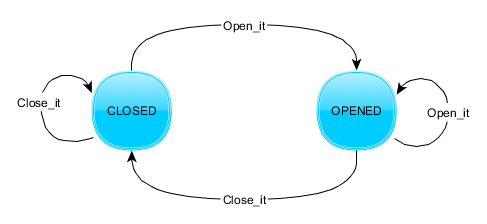A fsm(finite state machine) library, in order to simplify the work of handling state machine.
It's recommended to use FSM instead of if/else or switch code at the scenario with complicated logics.
- Pure C code
- Clear architecture
- Multiple FSM instances support
- Define your STATE, STATE_CALLLBACK_FUNCTION, EVENT and STATE_TRANSITION_FUNCTION.
- Create a fsm instance by
fsm_create(). - Add states, events and transition functions into fsm.
- Call
fsm_run()at appropriate place.
Take open and close the door as an example.
The state diagram is shown like below:
There are two states: CLOSED and OPENED.
Two events: Open_it and Close_it.
Two transition function: from CLOSED to OPENED and from OPENED to CLOSED.
In the code, we set state:
typedef enum {
DOOR_STATE_OPENED,
DOOR_STATE_CLOSED,
} door_state_t;In the state callback function part, we print out current state name and do nothing else, like this:
void door_opened(void)
{
i("The door has opened...\r\n");
}
void door_closed(void)
{
i("The door has closed...\r\n");
}Now we can get two state variables:
fsm_state_t state_opened = {DOOR_STATE_OPENED, door_opened};
fsm_state_t state_closed = {DOOR_STATE_CLOSED, door_closed};In regard to two events, we set like this:
typedef enum {
DOOR_EVENT_OPEN,
DOOR_EVENT_CLOSE,
} door_event_t;Then transition functions are set like this:
fsm_transition_t door_state_transition_list[] = {
{state_closed, DOOR_EVENT_OPEN, state_opened},
{state_opened, DOOR_EVENT_CLOSE, state_closed},
};Look into these transition funcitons, they are consisted of current state, event, and next state.
OK, add those stuff into a FSM variable:
fsm_addState(fsm, state_opened);
fsm_addState(fsm, state_closed);
fsm_addEvent(fsm, (fsm_event_t)DOOR_EVENT_OPEN);
fsm_addEvent(fsm, (fsm_event_t)DOOR_EVENT_CLOSE);
for (i = 0; i < door_state_transition_list_count; i++) {
fsm_addTransition(fsm, door_state_transition_list[i]);
}Of course we have to create a FSM variable at the beginning by:
fsm_t* fsm = fsm_create(state_closed); Where the parameter is the initializing state.
OK, we can handle state changes like:
fsm_run(fsm, DOOR_EVENT_OPEN);
fsm_run(fsm, DOOR_EVENT_CLOSE);Our test code is:
fsm_run(fsm, DOOR_EVENT_OPEN);
fsm_run(fsm, DOOR_EVENT_CLOSE);
fsm_run(fsm, DOOR_EVENT_OPEN);
fsm_run(fsm, DOOR_EVENT_OPEN);
fsm_run(fsm, DOOR_EVENT_OPEN);The result is:

The Heap Size of this project need to set larger than 0x400, as it uses logger library which consumes 0x200 heap memory.
